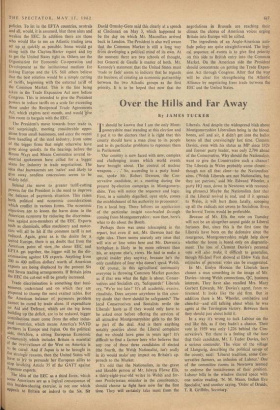Over the Hills and Far Away
By JAMES TUCKER 1T should be known that I am the only Mont- gomeryshire man standing at this election and I put it to the electors that it is right that this county should have a man close to its people and to its particular problems to represent them in Parliament.
'Our country is now faced with new, complex and challenging issues which world events have brought about. The control of nuclear weapons. . . .' So, according to a party hand- out, spoke Mr. Robert. Dawson, the Con- servative candidate, at a meeting during the present by-election campaign in Montgomery- shire. You will notice the sequence and logic. First, in a suitably dignified, oyez style, comes the establishment of his authority to pronounce: I'm a local boy. There follows an application of the particular insight vouchsafed through coming from Montgomeryshire: now then, here's what to do about the Bomb.
Perhaps there was some telescoping in the, report, but even if not, Mr. Dawson had the right idea. There seems scarcely any issue that will win or lose votes here and Mr. Dawson's birthplace is likely to be more relevant than his, or anyone else's, views. He had to make a special insider ploy anyway, because he's the only candidate of four who doesn't speak Welsh.
Of course, in this agricultural community everyone is throwing Common Market punches as if that was what the fight is about. Conser- vatives and Socialists cry, 'Safeguards!' Liberals cry, 'We're too late!' It's all academic, evasive, ritualistic. Does anyone anywhere in this coun- try doubt that there should be safeguards? The local Conservatives and Socialists revile the Liberals' haste as if they would only have to be asked once before offering the services of all attractive Montgomeryshire girls to the Six as part of the deal. And is there anything notably positive about the Liberal complaint that we should have gone in years ago? It's difficult to find a farmer here who believes that any one of these three candidates if elected (the fourth, the Welsh Nationalist, isn't really in it) would make any impact on Britain's ap- proach to the Market.
It's odd that the Nationalists, in the grave and likeable person of Mr. Islwyn Ffowc Elis, a thirty-eight-year-old writer in Welsh and for- mer Presbyterian minister in the constituency, should choose to fight here now for the first time. They will certainly take most from the Liberals. And despite the widespread blah about Montgomeryshire Liberalism being in the blood, bones, soil and air, it didn't get into the ballot boxes all that convincingly last time. Clement Davies, even with his status as MP since 1929 and former party leader, was only 2,794 ahead of the Conservative. Why should the Nationalists want to give the Conservative such a chance?
The Liberals in Wales probably come closest— though not all that close--to the Nationalists' aims. ('Welsh Liberals are not Nationalists, but they are patriots,' said Mr. Edward Wheeler, a party HQ man, down in Newtown with resound- ing phrases.) Maybe the Nationalists fear that if the. Liberal revival is real, and if it spreads to Wales, it will hurt them fatally, scooping up all the radicals not sworn to Socialism. Even the horrid Tories would be preferable.
Because of Mr. Elis the vote on Tuesday will not be an altogether. sound guide to Liberal fortunes. But, since this is the first time the Liberals have been on the defensive since the resurgence, Montgomeryshire might help show whether the boom is based• only on disgruntle- ment. The loss of Clement Davies's personal vote will also make it difficult to generalise, though Michael Foot showed at Ebbw Vale that estimates of personal votes can be exaggerated. In Mr. Emlyn Hooson the Liberals have chosen a man something in the image of Mr.
Davies—strong Welsh connections, QC, business interests. They have also recalled Mrs. Mary Garbett Edwards, Mr. Davies's agent, from re- tirement. It looks like the old firm. But in addition there is Mr. Wheeler, combative and cheerful—and still talking about when he was agent at the Torrington victory. Between them they should just about hold it.
In a way it's wrong to tack Labour on the end like this, as if they hadn't a chance. Their vote in 1959 was only 1,226 behind the Con- servative's. Yet there is a feeling all the time that their candidate, Mr. J. Tudor Davies, isn't a serious contender. The vicar of the village of Llangurig, describing the political set-up of the county, said: 'Liberal tradition, some Con- servative farmers, an infusion of Labour.' One of the committee rooms in Newtown seemed to endorse the tentativeness of their position. Labour bills in the window shared space with one notice reading, 'N. M. Mann, Indian Eye Specialist,' and another saying, 'Order of Druids, T. R. Griffiths, Secretary.'


































 Previous page
Previous page